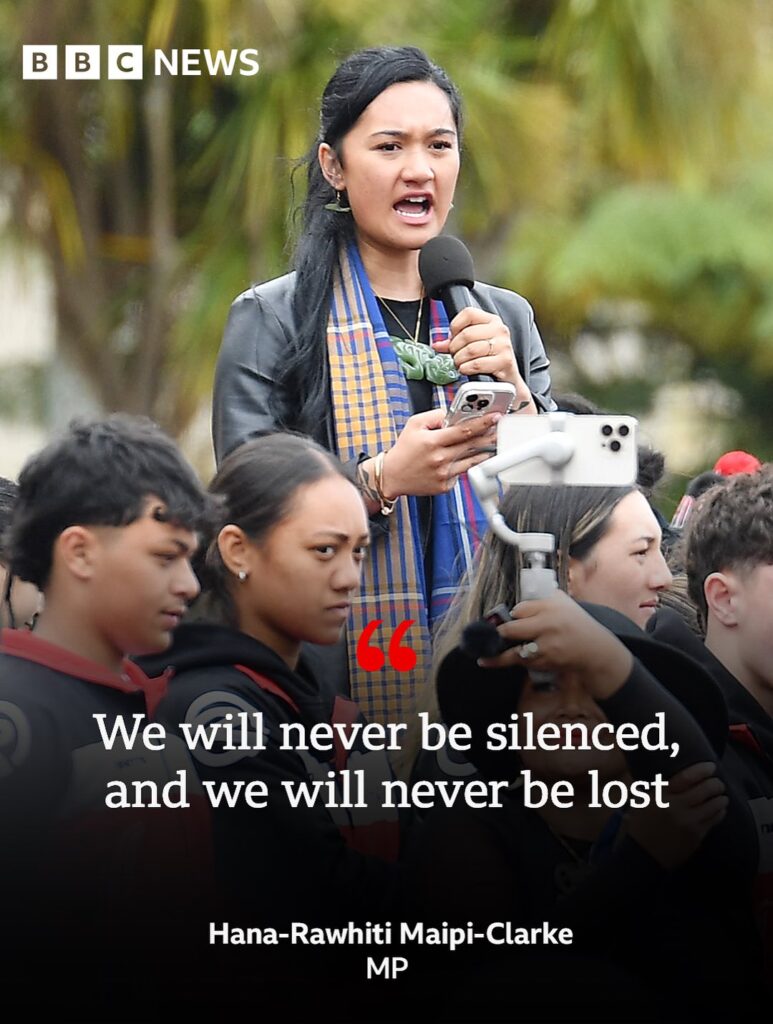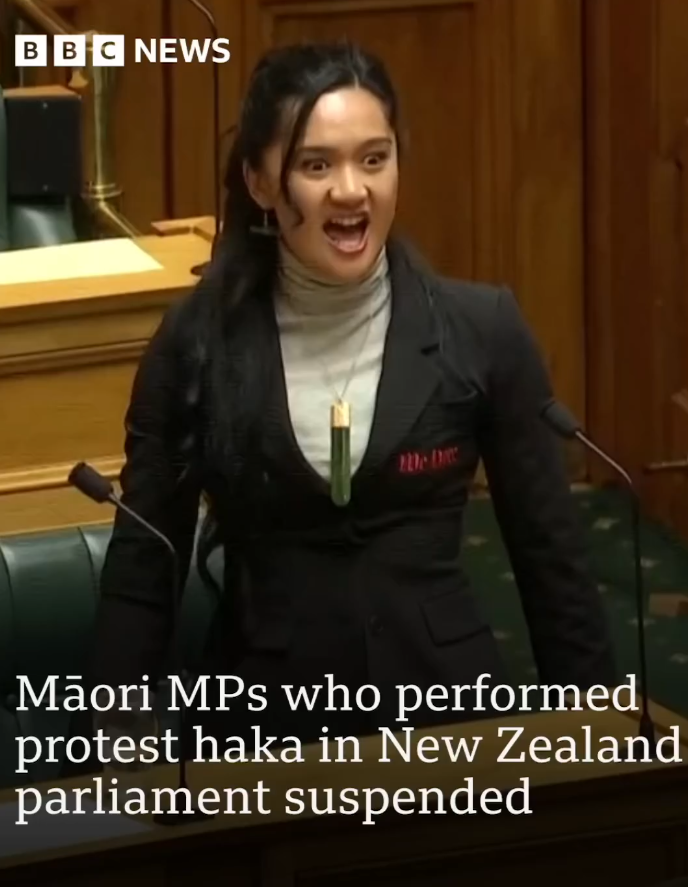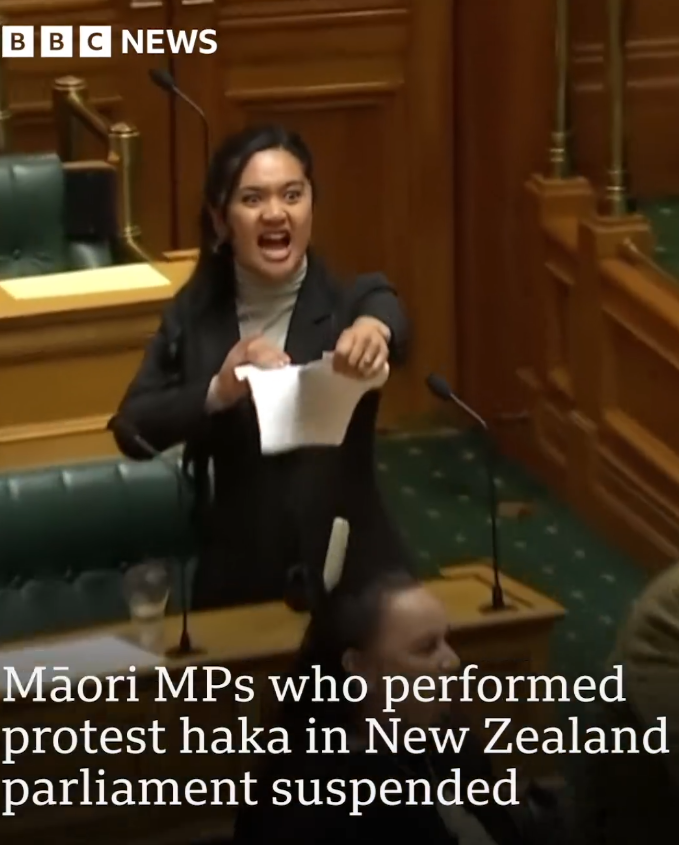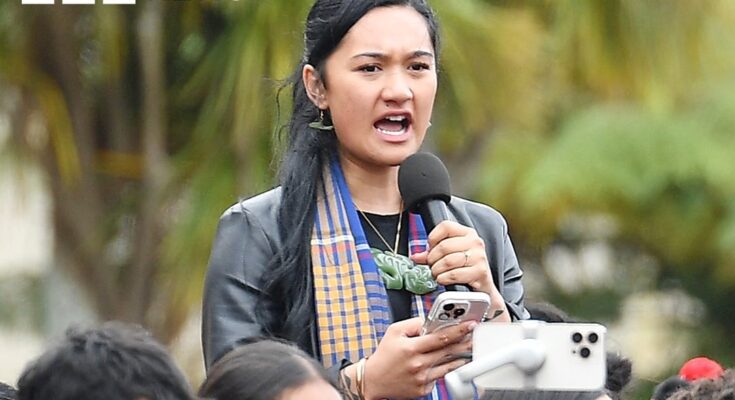
“We will never be silenced.”
That was the unwavering declaration from three Māori Members of Parliament in Aotearoa New Zealand who, after performing a passionate protest haka inside Parliament last year, have now been officially suspended from the chamber. The move has reignited national and global conversations about Indigenous rights, cultural expression, and the boundaries of protest in formal political spaces.
A Stand in Parliament
The protest took place in November of last year, amid tense parliamentary debate surrounding a proposed bill that would significantly reduce the role of te reo Māori (the Māori language) and other Māori protocols within government processes. As the bill progressed, many Māori and their allies viewed it as a direct attack on the principles of the Treaty of Waitangi — the country’s founding document signed between Māori chiefs and the British Crown in 1840.
During a heated session, three Māori MPs — Rawiri Waititi, Debbie Ngarewa-Packer, and Hana-Rawhiti Maipi-Clarke of the Te Pāti Māori (Māori Party) — stood in unison and broke into a haka, the traditional war dance and symbol of Māori identity, resistance, and pride.
The act was not only a cultural expression; it was a political statement — a way to confront what they saw as systemic erasure. As their voices echoed through the chamber, the protest haka visibly disrupted the proceedings. Some MPs responded with stunned silence, while others attempted to shout them down. Parliamentary security eventually intervened, and the session was adjourned early.
The Fallout

Nearly a year later, the New Zealand Parliament’s Privileges Committee has handed down its ruling: a formal suspension of the three MPs for what has been classified as “unparliamentary conduct.” The decision has drawn both support and condemnation from across the political spectrum.
Speaker of the House Gerry Brownlee defended the decision, stating that while cultural expression is respected in Parliament, “disruptive protest that halts the business of the House cannot be tolerated.” He added, “There must be a line between protest and procedure, and in this instance, that line was clearly crossed.”
But the response from Te Pāti Māori has been defiant.
“We will never be silenced.”

Speaking outside Parliament in front of a crowd of hundreds — many of whom were performing haka in solidarity — Rawiri Waititi told reporters:
“This is not just about us. This is about every Māori who has ever been told to sit down, be quiet, and know their place. We will never be silenced. Our culture is not a disruption. It is our identity. It is who we are.”
Co-leader Debbie Ngarewa-Packer echoed the sentiment:
“They can suspend us from their chamber, but they cannot suspend the truth. The truth is that our people are under attack — our language, our customs, our mana. This government doesn’t want to hear the haka because it reminds them that we’re still here, still fighting.”
Maipi-Clarke, the youngest MP in Parliament and a rising voice for rangatahi Māori (Māori youth), added:
“The haka is not a show. It’s a declaration. It’s saying ‘Enough. We see you. We remember who we are.’ If they think suspending us will shut us up, they’ve got another thing coming.”
Public Reaction
Reaction across New Zealand has been intense. Social media has been flooded with messages of support using hashtags like #WeWillNeverBeSilenced, #ManaMāoriMotu, and #LetUsHaka. Protests and haka flash mobs have appeared in Auckland, Wellington, and Christchurch. Māori leaders, artists, and academics have weighed in, many arguing that the suspension is symbolic of a larger, ongoing tension between Indigenous expression and colonial institutions.
Professor Moana Jackson, a renowned constitutional scholar, noted,
“Parliament may wear a veneer of inclusiveness, but when Māori assert themselves in ways that are unapologetically ours, we are told to behave. It’s a painful reminder that we are still navigating systems that were never built for us.”
Others, including some opposition politicians, have accused Te Pāti Māori of grandstanding and disrupting democratic processes for media attention. But even some of those voices admit that the punishment may have been excessive, potentially escalating the issue rather than resolving it.
A Larger Struggle
This moment is not isolated. It reflects a broader struggle within New Zealand about what it truly means to be a bicultural nation. The Treaty of Waitangi promises partnership, participation, and protection. Yet many Māori argue that those promises remain largely unfulfilled — especially when attempts to express or defend Māori identity are punished within the very halls of power.
In recent years, Māori activism has surged, with movements advocating for language revitalization, land rights, and structural reform. The haka — often performed by national sports teams — has become a global symbol of Māori culture. But when used as a tool of protest, its reception suddenly shifts.
This double standard has not gone unnoticed.
What Comes Next

As the suspension takes effect, Te Pāti Māori has vowed to take the matter to international human rights bodies. They’ve also promised more protest, more haka, and more unrelenting advocacy.
Meanwhile, their absence in Parliament will be felt — but their presence outside may grow even stronger.
Because for many, this is no longer about parliamentary rules. It’s about justice. It’s about voice. And most importantly, it’s about mana.
And in the words of Waititi, “You can take our seats, but you’ll never take our spirit.”



